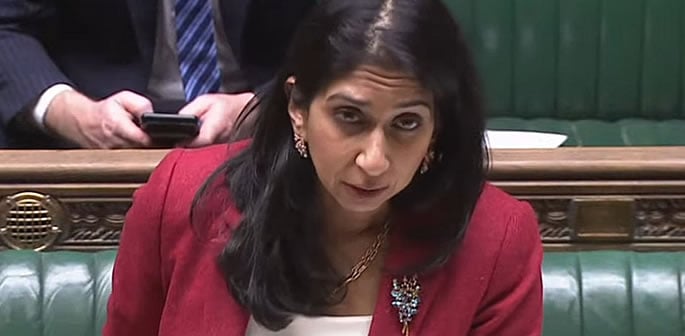Could the Illegal Migration Bill break Human Rights Laws?

Suella Braverman has spoken about the Illegal Migration Bill and admitted that it might break the Human Rights Act.
The Home Secretary said the bill allows the detention of illegal migrants without bail or judicial review within the first 28 days of detention until they can be removed.
Only those under medically unfit to fly, or at real risk of serious and irreversible harm will be able to delay their removal from the UK.
This has been described as an “exceedingly high bar”.
Any other claims will be heard remotely, after removal.
But Ms Braverman said she would not address the bill’s “full legal complexities today”.
She claimed: “Some of the nation’s finest legal minds have been – and continue to be – involved in its development.”
Ms Braverman said she was “confident that this bill is compatible with international obligations” but that she could not make a formal statement that the “robust and novel” plans comply with the Human Rights Act.
Afghans are the largest group of small boat migrants, but Ms Braverman said:
“All travelled through multiple safe countries in which they could and should have claimed asylum. Many came from safe countries, like Albania. Almost all passed through France.”
Ms Braverman said it will focus on removing “illegal entrants” to Rwanda or a “safe third country”.
However, the Rwanda scheme has not started because of legal challenges.
Albania is the only other nation to agree to the return of asylum seekers, with an EU-wide mechanism lost in Brexit.
The UK’s immigration detention estate is not big enough to hold a significant portion of small boat migrants ahead of deportation, and crossing the Channel to claim asylum was only made illegal on June 28, 2022.
Ms Braverman told parliament: “They will not stop coming here until the world knows that if you enter Britain illegally, you will be detained and swiftly removed.
“Removed back to your home country if it’s safe, or to a safe third country like Rwanda.
“That is precisely what this bill will do. That is how we will stop the boats.”
So far in 2023, almost 3,000 people have crossed the Channel, more than double by the same point in 2022.
Refugee charities and experts have repeatedly called for the government to set up alternative routes that remove the demand for English Channel crossings rather than pursuing increasingly punitive “deterrents” that have so far had little effect.
Ms Braverman did not commit to any new safe and legal routes, telling parliament that the government would introduce “an annual cap on the number of refugees the UK will resettle”.
Conservative grandee David Davis said the law may not succeed in its aims.
“Leaving aside any moral concerns, it’s got a lot of real practical problems.
“If we’re got to lock these people up, then where do they go?”
He and other senior Conservative Party members are concerned that the Illegal Migration Bill will be illegal, unworkable or will not take effect by the next general election.
Rishi Sunak has made “stopping the boats” one of his five priorities and has come under increasing pressure from Conservative MPs to take action as numbers continue to soar.
It is estimated that there will be another rise in small boat crossings in 2023, after successive annual records as previous attempted “deterrents” failed.